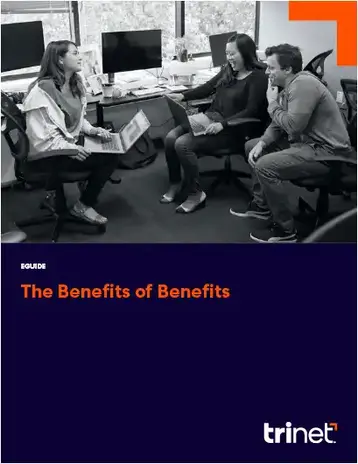
Savvy business leaders understand that their employees have responsibilities outside of work. Children and elderly family members may require care and attention, which can take considerable resources. Without support, employees may find it impossible to hold a job while caring for those loved ones. A dependent care flexible spending account can help. A dependent care FSA is a pre-tax benefit account employees and their spouses can use to fund specific dependent care services.
Employers may choose to contribute to employees’ dependent care flexible spending accounts (DCFSAs), but many questions surround the benefit. What can it be used for, who is eligible, and do set limits exist?
Being able to understand the details and explain them to employees is essential for using a DCFSA to the fullest. Let’s dig into how dependent care benefits work to gain a better understanding of their ins and outs.
How a dependent care FSA works
Enrolling in a dependent care flexible spending account (FSA) means the employee can use pretax dollars to pay for specific child care and adult-dependent care expenses that allow the employee to go to work. Expenses pertaining to children include:
- Daycare. Covering these expenses helps workers maintain their employment status and reduce their taxable income.
- Nanny. Hiring an individual to provide childcare at home or another location is covered by DCFSA.
- Babysitting. Babysitting, which typically refers to shorter or irregular periods of childcare, is another one of the qualified dependent care expenses.
- Before- and after-school care. Before- and after-school programs also qualify as eligible dependent care services.
Are summer camps eligible for dependent care FSAs?
The short answer is yes. Summer day camp is a qualified expense when applied to children younger than 13. However, overnight camps are not qualified expenses.
Why do age limits apply?
Running on the theory that teenagers don’t need supervision to allow their parents to go to work, legislation imposes an age limit on children who qualify for dependent care.
For summer camps, FSA funds cover expenses related to dependent children younger than 13 who live with the employee for more than half the calendar year. Older children may qualify if they are physically or mentally incapable of self-care.
If the parents are divorced, a child is a qualified dependent of the custodial parent. That's the parent who has been given legal control of the child by the court.
Qualifying child and adult dependent care services and expenses
DCFSAs can be used to pay for qualifying care provided to eligible minor and adult dependents so that the employee can continue working. An expense is considered work-related if:
- It allows the employee (and their spouse, if filing jointly) to work, try to find work or attend school full time.
- It is for a qualifying person’s care.
Eligible child and dependent care FSA expenses
Examples of eligible dependent care FSA expenses include:
- The cost of a babysitter or daycare provider for dependents age 12 and younger is eligible if the employee and/or spouse require the service so they can work.
- Daycare, after-school program care and day camps are generally eligible.
- Custodial care of an adult dependent who is mentally or physically incapable of self-care can be eligible so the employee can work.
- Senior, elderly or adult daycare centers.
- Household employees who care for a qualifying person.
- Transportation to and from eligible care.
Please note that requirements are very specific for adult dependents and may require medical documentation.
Ineligible child and adult DCFSA expenses
Not all expenses relating to dependents are covered by a DCFSA and/or the IRS' child and dependent care tax credit mentioned further into this article. Dependent care costs that may not be covered by either include:
- Anything not directly related to custodial care, such as supply fees, food/meals, etc.
- Preschool and nursery school tuition.
- Education tuition for grades kindergarten and above.
- Placement and registration fees.
- Overnight camps.
- Custodial care that is not for the express purpose of allowing the employee to work, as in babysitting while the parent goes to dinner, on vacation, etc.
- Expenses for adult dependents that are related to medical/nursing care or food/meals are ineligible.
Employer contributions to dependent care FSAs
Employers can choose to contribute to employees’ dependent care flexible spending accounts. However, the combined employer-employee annual contribution must not exceed the IRS limits for the applicable year.
What are the limits on employer contributions to dependent care FSAs?
Employers should understand and consider DCFSA limits within the following context, including these two important points:
- Employer contributions to DCFSAs are not a match. Employees will receive the full employer contribution amount regardless of what the employee's own choice is, even if they elect $0.
- As with medical FSAs, employer contribution amounts for dependent care FSAs are set during company plan open enrollment. They cannot be changed until the end of the plan year.
Per the IRS' most recent guidelines as of the date of this article publication, the dependent care FSA limit on combined contributions is $5,000 for qualifying individuals who are one of the following:
a) Single.
b) Head of household.
c) Married and filing a joint tax return.
For example, if an employer has elected a $2,000 contribution, employees may contribute up to an additional $3,000.
The combined maximum is set at only $2,500 for married couples filing separately.
Can I claim the child and dependent care tax credit using my DCFSA expenses?
It’s important to understand the relationship between the dependent care FSA and the Child and Dependent Care (tax) Credit. Generally, a person can’t claim a tax credit on any expense paid by pretax dollars from an FSA.
If the DCFSA doesn’t cover all the eligible expenses, then a person can claim a tax credit on the amount exceeding the FSA contributions (up to the IRS limits).
For example, if your annual childcare costs are $8,000, and you pay $5,000 from your FSA, you may be able to claim the tax credit on the remaining $3,000.
Eligible employees who sign up for DCFSA can attempt to claim the child and dependent care tax credit for eligible expenses. Qualifiers apply to claim this credit. For example, employees and their spouses who are filing jointly must have earned income unless the spouse is actively looking for work, a full-time student or disabled.
What happens to leftover funds?
Funds remaining in an employee's account at the end of the year won't necessarily be automatically lost. The employer can offer a grace period of up to 2 1/2 months to give the individual time to spend the balance. Employers can also offer an option for the employee to roll over up to $610 at the end of the year.
Need more answers?
Since the regulations regarding dependent care FSA are multi-faceted, things can get confusing. Here are some helpful links to more detailed explanations and information:
- Flexible Spending Accounts Program - 2023 limits.
- IRS Publication 503 - Current publication on child and dependent care expenses and more.
Managing personal responsibilities and the costs that come with them are crucial issues for employees with families. A dependent care flexible spending account is a valuable tool to reduce the stress of these situations. It helps employees cover childcare and elder care expenses with pretax dollars so they can work.
The DCFSA is a unique opportunity for employers to foster and encourage a healthy work-life balance for their employees. It can help reduce their tax burden and ease the financial strain of paying for childcare and elder care. As employers increase their focus on a strong, diverse culture, these types of programs will be integral to a high-performing workplace.
Finally, remember that laws change. To ensure IRS and tax compliance, it's wise for employers and employees to consult an attorney, accountant or other professional for legal or tax advice. Reliable options for employers also include reputable human resources service providers. HR providers, including professional employer organizations (PEOs) such as TriNet, offer management and administrative services in the areas of payroll, taxes, benefits, compliance and more. This saves businesses and their employees time, money and risk. To learn more about FSAs, benefits and other HR services to suit your organization, speak with a TriNet representative today.






